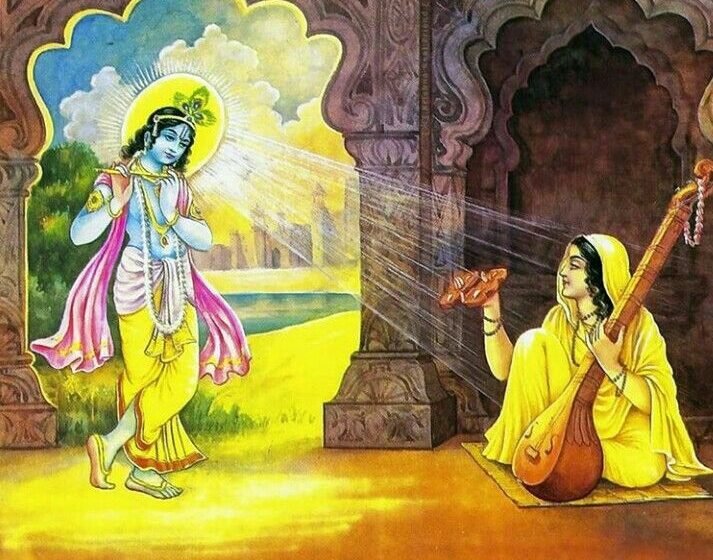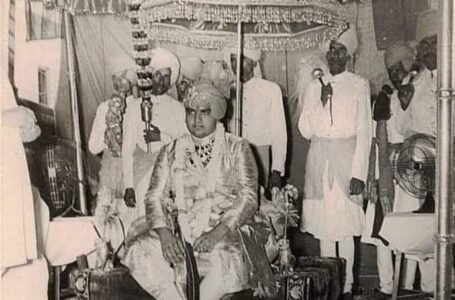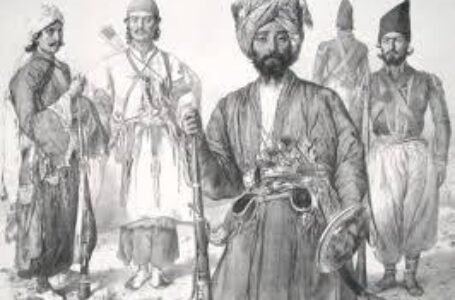The Evolution of Nature Imagery in Hindi Poetry – From Bhakti to Chhayavaad

Poetry now seems to be fleeing, as if restless in its own skin!
The nearby poems catch wind of its urgency, stirring in quiet unease.
Each verse dares to stretch beyond its boundaries,
pausing mid-flight to wrestle with the weight of its own thoughts.
The Bhakti Kaal (Devotion Period) left a profound mark on Hindi literature. Spanning from 1375 to 1700, this era was defined by an intense devotion to God (ईश्वर). Bhakti literature primarily expresses deep love and unwavering devotion towards a personal deity, often Krishna, Rama, or Shiva. These works are characterized by emotional intensity, frequently using metaphors of romantic love to depict the devotee’s relationship with the divine. The literary output of this period includes poems, songs, philosophical treatises, and hagiographies, all of which contributed to the rich spiritual and cultural heritage of Hindi poetry.
The Bhakti Movement focused on devotion to God, emphasizing surrender, divine love, and social reform. It had two major streams: Nirguna Bhakti (worship of a formless God, as seen in Kabir and Dadu) and Saguna Bhakti (worship of God in a personal form, as in Tulsidas, Surdas, and Meera Bai). The poetry of this era was written in simple, regional languages to connect with the masses and often criticized social evils like caste discrimination and ritualism. The central theme was the intense love and surrender to God, often expressed in emotionally charged verses.
In contrast, Chhayavaad was a literary movement in modern Hindi poetry that emphasized individualism, romanticism, and mysticism. It was marked by the expression of personal emotions, love for nature, and a quest for self-discovery. Poets like Jaishankar Prasad, Suryakant Tripathi ‘Nirala’, Sumitranandan Pant, and Mahadevi Verma used highly refined, metaphorical language to explore themes of solitude, human emotions, and nationalism. Their poetry was more abstract and symbolic, drawing from Sanskrit traditions while being deeply introspective.
While Bhakti poetry sought divine connection, Chhayavaad poetry sought self-exploration and artistic beauty. Bhakti poetry was direct and devotional, while Chhayavaad was metaphorical and introspective, reflecting a shift from religious devotion to human emotions and national consciousness. Both movements, however, played a crucial role in shaping Hindi literature and continue to inspire generations.
Kabir’s poetry is not just a collection of verses but a mirror reflecting the essence of human existence. His words, raw and unapologetic, strip away the illusion of ego, caste, and blind rituals, urging people to seek truth within. When he says, “Moko Kahan Dhundhe Re Bande, Main To Tere Paas Mein,” he isn’t just rejecting organized religion—he is reminding us that the divine is not locked away in temples or mosques but breathing within us. His poetry speaks to the restless soul, the one trapped in desires, whispering that no amount of wealth or knowledge can match the power of love and humility. In his doha, “Mati Kahe Kumhar Se, Tu Kya Rondhe Mohi, Ek Din Aisa Aayega, Main Rondhungi Tohi,” he doesn’t just talk about death—he makes us feel it, makes us pause and question the arrogance we carry. Kabir’s verses are not to be merely read; they are meant to be lived, felt, and understood in the silences between words. His poetry, timeless and piercing, does not age—it simply waits for the right moment to strike the heart.
Chhayavaad poetry isn’t just about words on a page—it’s about feeling the weight of loneliness, the pull of nature, and the silent storms inside the soul. It’s the kind of poetry that doesn’t just speak; it lingers, whispers, and sometimes even aches. Jaishankar Prasad, in Kamayani, captures that moment when bottled-up pain finally spills over, saying, “Jo ghanibhut peeda thi, mastisk mein smriti-si chhayi, dukhon ki marmibhoot madhurta, ab aansuon mein bah aayi.” It’s the feeling of holding in too much for too long until it all comes rushing out. Sumitranandan Pant, the poet of nature, reminds us how fragile moments are, urging us not to grasp too hard, saying, “Chhaya mat choona man re, nadi kinare baithi tu akeli.” It’s as if he’s telling us—some things are meant to be felt, not possessed. And then there’s Mahadevi Verma, whose poetry feels like an echo in an empty room. She hides her pain behind a smile, writing, “Maine apna dukh dard seena, sabse chhipa kar rakha hai, jeevan bhar main hasi dikhayi, andar andhiyaara rakha hai.” Who hasn’t felt that? Pretending to be okay when, deep down, a quiet sadness lingers. Nirala, on the other hand, refuses to stay silent. His poetry crashes like waves in the dark, saying, “Main akela, aadhi raat mein, laharon se takraata raha.” He stands alone, unshaken, daring to go against the tide. That’s what makes Chhayavaad so powerful—it’s not just poetry, it’s a mirror to the soul. It doesn’t just describe emotions; it makes you feel them. It’s about longing, loss, beauty, rebellion—it’s about being human.
The poetry of the Bhakti era feels like a quiet conversation between the soul and the world—a reminder of what truly matters. Saint Kabir’s words, “The clay says to the potter, why do you trample me? A day will come when I shall trample you instead,” carry a truth we often ignore. We live as if we own time, shaping our lives with pride, but one day, the same earth we walk upon will embrace us in its fold.
Kabir’s poetry doesn’t preach; it speaks. It challenges human arrogance, gently reminding us that we are not as invincible as we think. His verses strip away illusions, showing us the raw, simple truth: life is fleeting, and humility is the only way to live meaningfully. The Bhakti poets, much like Kabir, did not write for kings or scholars alone—they wrote for everyone. Their words were meant to be heard in the streets, in quiet moments of reflection, in the everyday rhythm of life. They questioned the walls of caste and hypocrisy, urging people to see beyond man-made divisions.
Even today, Kabir’s words feel alive. They ask us to pause, to listen, to step away from the noise of our ambitions and remember that, in the end, we all return to the same earth. His poetry is not just a lesson but a quiet nudge toward something deeper—a truth we already know but often forget.
Gopal Das Neeraj was a highly popular Hindi lyricist, honored with the Padma Bhushan and several other prestigious awards. One of his poems.
“Aaj ki raat tujhe aakhri khat aur likh doon”
Tonight, Let Me Write You One Last Letter
Tonight, let me write you one last letter—
Who knows if this lamp will burn till dawn?
In this era of bombs and gunpowder,
Who can tell if such fragrant winds will ever blow again?
Life is nothing but fodder for tanks and cannons,
And man is just a bullet, a cartridge in war.
Civilization has turned into an exhibition of corpses,
And the colors of Holi have been replaced by fresh blood.
Who knows if tomorrow, in your narcissus-like eyes,
Dreams will bloom—or the death of a dream will unfold?
And when the devil wraps itself around your silken scarf,
Will the moon weep, or will a shroud cover its glow?
Nothing is certain in this valley of death—
Whose morning might turn into dusk, no one knows.
May your wedding canopy remain adorned with stars,
But what if this bridal procession gets lost in darkness?
The sorrow of a country crushed by hunger and poverty—
I fear that tomorrow, it may turn me against myself.
The blood of breaths strangled under the shadow of oppression—
What if it sets my voice ablaze with fire and fury?
Perhaps the broken bangles on the empty streets
Will keep me from bringing you bracelets tomorrow.
Perhaps the smoke from scorched gardens and lost petals
Will stop henna from coloring your fair hands.
It is possible that in the ruins of deserted villages and lanes,
I may not even find the time to come near you.
To drink from the intoxication of your deep eyes,
To run my fingers through your tangled locks.
But if empty courtyards and weeping doorways call me,
What will I do if my duty demands me to rise?
If I must go, weary from this journey,
And my songs rise with me as my only companion—
Then tonight, let me write you one last letter.
Tonight, I will step into the river of fire.
I swear upon your ivory-white, sandalwood arms—
If I return, I will bring you a new moon.
Through the eyes of Chhayavad, this poem is one of the deepest cries of love, longing, and unbearable pain for an uncertain tomorrow. A Chhayavadi poet doesn’t just write a letter but pours his soul onto the page, not knowing if he would ever see his beloved again. The moon, the stars, and soft night air are not just components of nature but silent witnesses to their emotions, as Mahadevi Verma’s poetry transforms solitude into something sacred. The war is not only outside—it goes on inside, tugging at the poet between his duty and desire, between fear and hope. There is a dreamlike quality, a Chhayavadi mysticism, in the way they imagine the future—will their beloved’s eyes still hold dreams, or will those dreams die with the war? And yet, there is a desperate clinging to beauty, to love, to hope to return in the light of a ‘new moon’ – a symbol for renewal and reunion. The poem, much like Chhayavad itself, turns pain into poetry, loss into longing, and love into something eternal.
Inspired by similar themes, the following poem reflects the essence of Chhayavad through its imagery, introspection, and emotional depth, echoing the movement’s romantic and symbolic approach to poetry. My poem blends nature with human emotions, using falling leaves and blooming flowers as metaphors for loss and hope.
जो पत्ते झड़ चुके, वो आंगन में बिख़रे पड़े हैं
जिन पत्तों का झड़ना अभी बाक़ी हैं, वो दरवाज़ा खटखटा रहे हैं….
अब सुर्खियों में कुछ रहा भी तो वो था एक मैं और एक ये डाल मेरे हाथ में।
पैरों को मेरे मानो ज़मीन खीचती,
हाथों में मेरे जैसे वो डाल चुभती।
मगर देखो तो!……चिंतन में मेरे
हमेशा एक फूल आता,
जब भी डाल को पकड़ता…..
एक फूल आता!!!
Deep introspection on life, change, and memory lies at the essence of this poem.
Fallen leaves symbolize past experiences and lost moments, and the knocking of leaves at the door symbolizes changes that are about to occur. The branch that pricks the hand signifies the struggles and burdens of life, and the flower that comes up in thoughts each time represents hope, beauty, or a cherished memory.
Like Chhayavad poetry, this composition beautifully intermixes nature and emotions to explore the symbolic nature of longing, transformation, and inner reflection.


